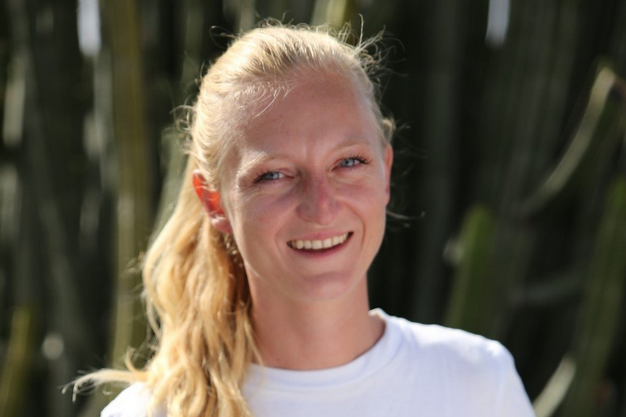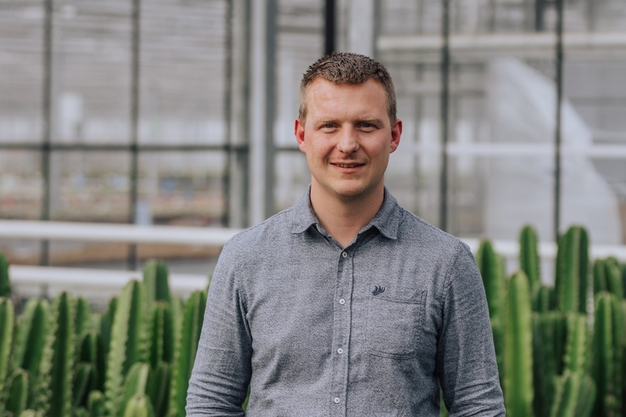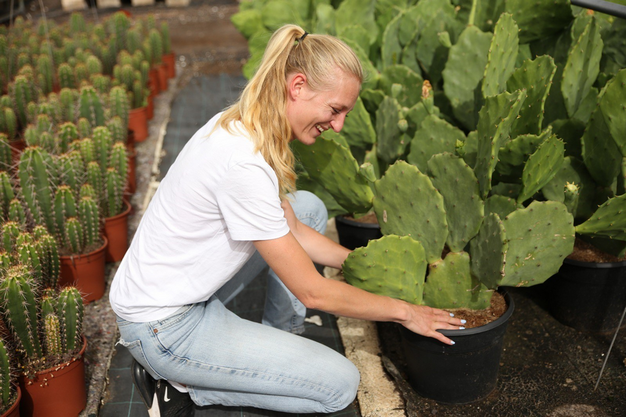How is the new generation of growers coping with the increasingly internationalizing ornamental plant market? Hanneke and Bas Ubink are the fifth generation in the family business Handelskwekerij Ubink bv, known for its cacti and succulents. He works in the Netherlands, and she is from sunny Tenerife, where a production site sits. "I do believe in helping each other anyway. You never know what the future holds."
You grew up across the street from the nursery. Was it always your dream to enter your father and uncles' business as successors?
Bas: "When we were little, everything revolved around the business. I also worked there in vacations, for example. I was always busy with it. When I got older, that changed. I chose a study that I myself found interesting, and worked for a while at a large company in a different sector. At a certain point, I made a conscious decision to return to the family business. The world of plants continued to attract me. It moves very quickly, is dynamic. In addition, entrepreneurship was in me. I wanted to pioneer. To be able to respond quickly to developments in the market. From my own company that's easier."
Hanneke: "My father once said: 'If you really want to grow in the family business, you have to get in before the age of 30.' Like Bas, I too opted for a broader study than horticulture. But I always kept in mind that this expertise could also be useful for the company. When you asked me as a child what I wanted to do later, my answer was: cactus grower. That is still in several of my friends' books from back then. After college, I worked at the financial services firm PwC. For me, the turnaround came partly because of that one statement by my father. And because at a certain point, I thought: am I really going to do the work I am doing now in this big company all my life? So the answer was no."
As a new generation, what do you bring to the family business?
Hanneke: "Let me start with: it is very nice that we can still run the company together with our father and uncles. There are so many species in the world of cacti and succulents. It requires a special fingerspitzengefühl to know what will be a trend in the market next year. Plus: they know the undulations that the market makes. If trade slumps for a while, I'm at a loss. My father reassures me. He is confident that things will pick up. He has been through this so many times before. But of course, as a new generation, we also look at the market and the world differently. Because it's changing incredibly fast."
 Hanneke Ubink
Hanneke Ubink
You are the founders of webshop House of Cactus. Is that typically a direction you are developing as a new generation?
Bas: "That is indeed a project of me and Hanneke. The online world is a bit further away from our fathers and uncles. But for us it is an important step towards the future. The webshop is a way for us to investigate what works well online now, in terms of product range. How can we optimally take care of our customers? And which plants do or do not lend themselves well to packaging and shipping? What happens if you start dropshipping? And how can you make the whole thing profitable? This project helps us discover the increasingly digital market."'
 Bas Ubink
Bas Ubink
How do you view internationalization?
Bas: "Our main sales channels are Naaldwijk and Aalsmeer. We actually do everything through the auction. Via exporters, our plants then go to all countries in Europe. We do see that the end customer is becoming increasingly important. And that you are more interested as a nursery if you supply for the entire chain. So not only plants but also, for example, pots."
Hanneke: "The center of gravity for us remains with the European market. Other parts of the world have their own nurseries for cacti and succulents. It is not interesting for us to compete with them. We did recently receive a visit here in Tenerife from an entrepreneur from the United States who wanted to expand his cactus cultivation. I am happy to help someone like that. I don't see him as a competitor. And it was interesting to learn from each other. With us everything goes through the auction, but they deliver directly to stores. That is a totally different way of working. I do believe in helping each other anyway. You never know what the future will bring, and what you will need each other for again."
What is your biggest challenge right now?
Bas: "Personnel. That is a challenge that everyone feels, and it will only get bigger in the coming years. That's why we work with schools. We try to show young people that a future at a nursery is very exciting. And of course, we also deploy employees from across the border."
Hanneke: "The working language in the Netherlands is Dutch. Or English, if there really is no other way. But the people who come to work for us first receive training in which they learn about plants as well as the language. In Tenerife, the official language is Spanish. Fifteen nationalities work together here. Most of them come from South America. But we also have people from Poland. Sometimes this clashes in the beginning because of the differences in culture. That's why I always say: start working together and start talking to each other. That way you get to know each other better. And that works. We are still a family business in corporate culture as well."

Bas: "Another challenge is the image of the sector. That is under a lot of pressure."
Hanneke: "Now come the footprint calculators, which in my view is mainly about: transparency in the market. I am not afraid to tell what we use here at the nursery. But not everyone wants that. If the whole sector was transparent, the consumer would also see better: there are very beautiful Dutch products grown with very little environmental impact."
What is Royal FloraHolland's role in this area?
Bas: "The cooperative must remain neutral in this area. And above all make it possible for us to be as transparent as possible. For example, by being able to indicate in Floriday how we grow, what we do or do not use, and which certificates we have."
Hanneke: "I don't think Royal FloraHolland should force the achievement of certificates. A grower with a few hectares in his backyard who only supplies a small group of regular customers every year, let him go his own way. Let the cooperative focus on making the system more transparent. Because only then will you really give the market and the grower a fair choice."
For more information:
Royal FloraHolland
www.royalfloraholland.com










